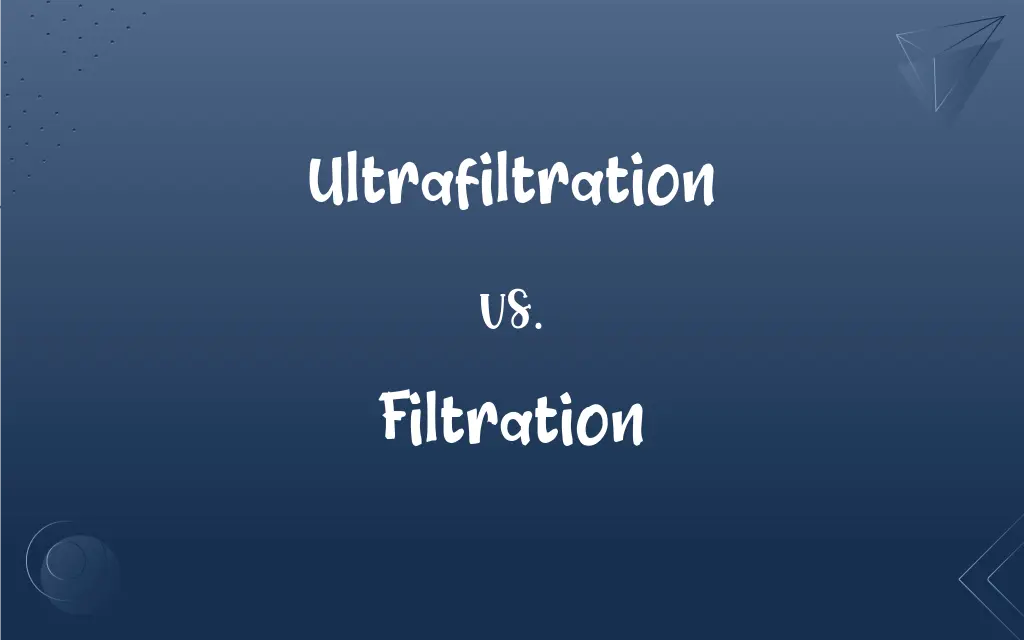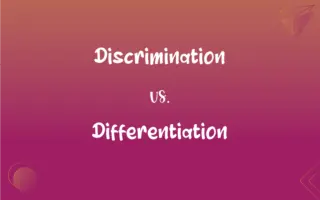Ultrafiltration vs. Filtration: What's the Difference?
Edited by Aimie Carlson || By Janet White || Updated on October 2, 2023
Ultrafiltration is a type of filtration that uses a semipermeable membrane to separate particles as small as 0.01 micrometers, often for purifying liquids. Filtration, in contrast, is a broader term referring to the separation of particles from a fluid or

Key Differences
Both ultrafiltration and filtration are separation processes used to remove solid particles from liquids or gases. Ultrafiltration is a specific type of filtration that employs a semipermeable membrane to filter out extremely small particles. Filtration, on the other hand, can use a variety of filter media, such as paper, cloth, or activated carbon, and does not necessarily remove particles as small as those removed by ultrafiltration.
Ultrafiltration is commonly used in specialized applications such as water purification, medical treatments, and laboratory research. Filtration, however, is a much broader category that includes everyday applications like air purifiers, coffee brewing, and automotive oil filters.
In ultrafiltration, the pores of the semipermeable membrane are so small that even microscopic particles can be removed from the liquid. In general filtration, the size of the particles removed is determined by the type and design of the filter medium, which can range from coarse to fine.
Ultrafiltration usually requires higher pressure to push the liquid through the semipermeable membrane. In regular filtration, the pressure required can be significantly lower, depending on the material and the size of the particles being separated.
Although ultrafiltration is a type of filtration, it's often considered a more advanced or specialized form due to its capability to remove particles down to the nanometer scale. Standard filtration techniques are often less precise and can allow smaller particles to pass through.
ADVERTISEMENT
Comparison Chart
Filter Medium
Semipermeable membrane
Variety (e.g., cloth, paper, mesh)
Particle Size Removed
As small as 0.01 micrometers
Varies widely
Pressure Required
Usually higher
Usually lower
Common Applications
Water purification, medical treatments
Coffee brewing, air purification
Precision
More precise
Less precise
ADVERTISEMENT
Ultrafiltration and Filtration Definitions
Ultrafiltration
A method to purify liquids.
We used ultrafiltration to obtain pure water.
Filtration
A method for separating solids from fluids.
Sand filtration is common in wastewater treatment.
Ultrafiltration
A high-pressure filtration process.
Ultrafiltration requires higher pressure than standard filtration.
Filtration
A technique involving a filter medium.
Filtration through activated carbon removes odors.
Ultrafiltration
A specialized form of filtration.
Ultrafiltration is used in pharmaceutical manufacturing.
Filtration
An essential process in various industries.
Filtration is crucial in automotive oil systems.
Ultrafiltration
A separation process using a semipermeable membrane.
Ultrafiltration is essential in dialysis treatments.
Filtration
The act of removing particles from a liquid or gas.
Filtration is used to clean swimming pool water.
Ultrafiltration
A technique for removing very small particles.
Ultrafiltration can remove bacteria from water.
Filtration
The act or process of filtering.
Ultrafiltration
The filtration of a solution or colloidal substance through a semipermeable medium that allows only the passage of small molecules.
Filtration
The act or process of filtering; the mechanical separation of a liquid from the undissolved particles floating in it.
Ultrafiltration
Filtration through a semipermeable membrane that only allows small molecules through.
Filtration
A totally ordered collection of subsets.
Filtration
The act or process of filtering; the mechanical separation of a liquid from the undissolved particles floating in it.
Filtration
The process whereby fluids pass through a filter or a filtering medium
Filtration
The act of changing a fluid by passing it through a filter
Filtration
A broad category of separation methods.
Filtration techniques vary from simple to complex.
FAQs
What is ultrafiltration?
Ultrafiltration is a specialized form of filtration using a semipermeable membrane to remove very small particles from liquids.
What filter media can be used in filtration?
Various media like cloth, paper, and activated carbon can be used in filtration.
What is filtration?
Filtration is the process of removing solid particles from liquids or gases using a filter medium.
How small are the particles removed by ultrafiltration?
Ultrafiltration can remove particles as small as 0.01 micrometers.
What filter medium is used in ultrafiltration?
A semipermeable membrane is used in ultrafiltration.
Is high pressure required for ultrafiltration?
Usually, yes. High pressure is often required to push liquid through the semipermeable membrane.
Where is filtration commonly used?
In everyday applications like air purifiers and coffee brewing.
Is ultrafiltration more precise than filtration?
Generally, yes. Ultrafiltration is more precise in removing smaller particles.
Is high pressure required for filtration?
Not necessarily. The pressure required for filtration can vary.
Is ultrafiltration a type of filtration?
Yes, ultrafiltration is a specific type of filtration.
Can filtration remove bacteria?
It depends on the type of filter medium and its pore size.
Can ultrafiltration remove bacteria?
Yes, ultrafiltration can remove bacteria and other microorganisms.
How small are the particles removed by filtration?
The size varies widely depending on the filter medium used.
Where is ultrafiltration commonly used?
In water purification, medical treatments, and lab research.
Are ultrafiltration and filtration used in industry?
Yes, both are used in various industries for separation and purification processes.
About Author
Written by
Janet WhiteJanet White has been an esteemed writer and blogger for Difference Wiki. Holding a Master's degree in Science and Medical Journalism from the prestigious Boston University, she has consistently demonstrated her expertise and passion for her field. When she's not immersed in her work, Janet relishes her time exercising, delving into a good book, and cherishing moments with friends and family.
Edited by
Aimie CarlsonAimie Carlson, holding a master's degree in English literature, is a fervent English language enthusiast. She lends her writing talents to Difference Wiki, a prominent website that specializes in comparisons, offering readers insightful analyses that both captivate and inform.































































